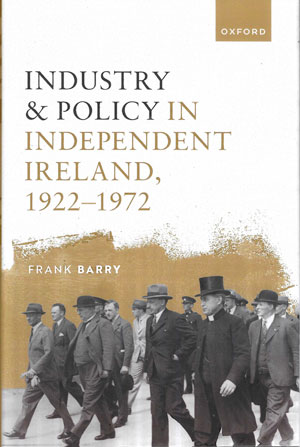
FRANK BARRY
Oxford University Press
£70
ISBN 9780198878230
REVIEWED BY Colm Keena
Colm Keena is a journalist with the Irish Times.
A late friend of mine who attended a Church of Ireland school used to tell of going for a job interview with Guardian Royal Exchange in Dublin in the late 1960s and not giving much for his chances. He had a less-than-stellar Leaving Cert and, while waiting his turn to pitch for the job, got into conversation with another applicant, a Catholic, who had done marvellously well in the exam. Much to his surprise, my friend got the job. Furthermore, when he turned up for work, he discovered that (a) the studious Catholic was nowhere to be seen and (b) most of his new colleagues kicked with the same foot as he did. Putting two and two together, he decided that being a Prod in the then decidedly Catholic Dublin had its advantages.
I was reminded of the story when reading Frank Barry’s book, which, among other matters, considers sectarianism in Irish business during the period surveyed. Barry is Professor of International Business and Economic Development at Trinity College, Dublin, and his book is a study of the ownership, foreign and indigenous, nationalist and unionist, of the major enterprises in the southern Irish economy over the period, in the context of the changing environment with which the businesses had to grapple. The book is the fruit of a long period of research and comes replete with lists of different establishments and sectors and employment statistics from the period surveyed. This reader found the lists enjoyable, not least because of the names they included (Merville Dairies, Pim Brothers, Gouldings, Unidare, Clondalkin Paper, the Irish Press) and the activities listed (brewing, distilling, bacon-curing, car assembly, and the making of carpets, footwear, paper, confectionery and sugar).
Numerous broad points are made over the course of the short book, such as that the Free State, unlike many newly independent entities in Eastern Europe, held back from introducing a policy of import substitution in the wake of the First World War, in part because of the extent to which Irish agriculture depended on exports to the UK. Eventually, in the 1930s, when Ireland turned away from free trade as export markets collapsed internationally, it had lots of company. Where it differed from its European neighbours was in persisting with the policy into the 1950s and 1960s. A major reason for this, Barry says, is that when you create tariffs and an import substitution regime you create players with a vested interest in keeping the system in place. He doesn’t say why we took longer than others to find our escape hatch.
There were significant employers in southern Ireland a century ago, such as Guinness, W. & R. Jacob, the Condensed Milk Company, Ford and the Dublin Dockyard Company. Barry draws attention to the extent to which the southern business élite was predominantly Protestant and unionist. The cleavage between the élite and the predominantly nationalist population would constrain economic policy-making through the 1920s and beyond, according to Barry. He notes, however, that the business élite did decide early on to throw in their lot with the new state, preferring it to the chaos that had preceded independence.
Senior figures in the Department of Finance had absorbed the outlook of the London Treasury prior to independence, and this contributed to the caution that the new state adopted in its fiscal affairs. Such caution may have been lacking in other new European states of the interwar period, Barry notes. The tradition of caution clashed with the views of those who had fought for independence, many of whom believed that, once achieved, Irish freedom would herald rapid economic improvement—which, of course, did not turn out to be the case.
The Industrial Development Authority was established in 1949 to kindle new life in the southern economy by supporting new industries rather than those already in existence. It is an error, Barry says, to conflate the export-oriented foreign direct investment strategy introduced in the 1950s—which did not constitute a direct threat to protected industries—with the trade liberalisation of the following decade. It was during the 1960s, as protectionism was being dismantled, that the Irish Times noted that the ‘day of the identifiably “Protestant” or “Catholic” firm is passing’. International competition shook up not just a sclerotic business environment but also the sectarian mind-set of many southern boardrooms.
While the decades after independence were a period of disappointing economic growth, the performance was not so poor when compared with what was happening internationally, Barry writes. The policy of attracting export-orientated foreign investment in the 1950s and the prospect of EU membership from the 1960s provided the means of escape from the vested interests trap, but world events and poor fiscal decisions held us back initially from the expected benefits of our joining the EEC. However, those benefits have since arrived.
The sectors targeted by the foreign multinationals that set up operations here in the post-1955 period have remained the major merchandise export sectors up to today. More recent times have seen not just foreign multinationals but also indigenous firms prospering from the scenario that now prevails. The story of the emergence of new, export-oriented indigenous businesses is, Barry writes, a project for the future. No doubt he is already working on the lists.
